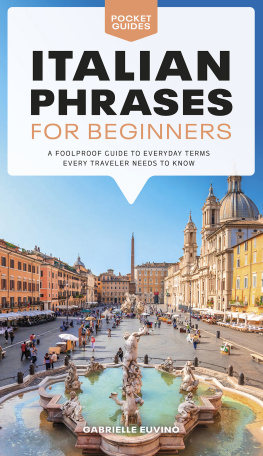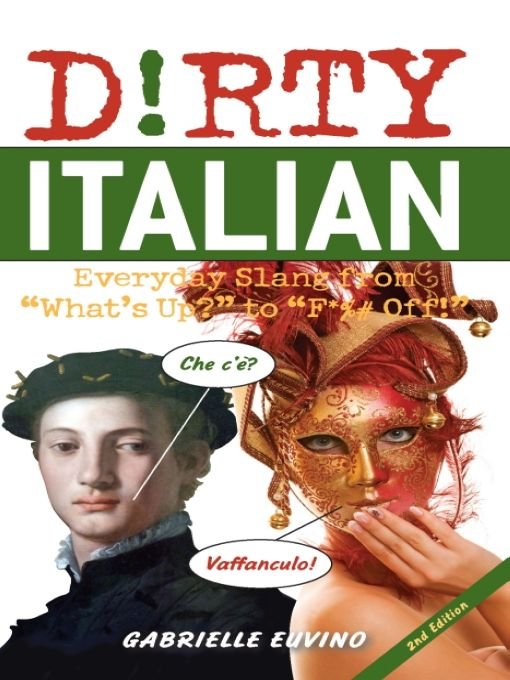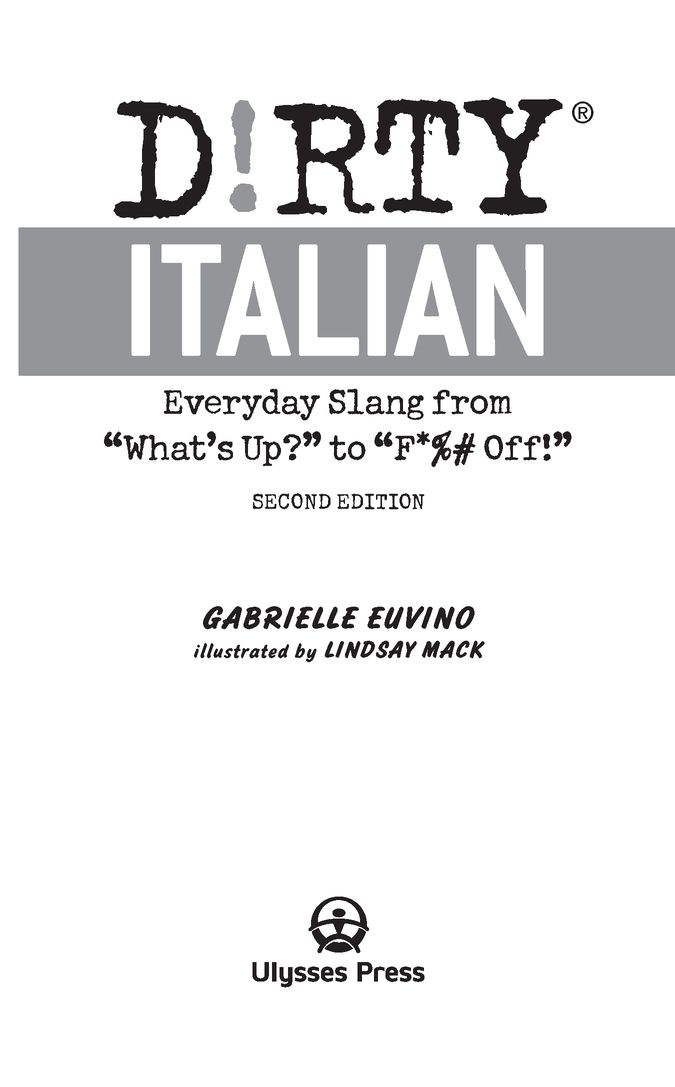Table of Contents
Special thanks to:
Laura Anson
forgiving eyes to the angels.
Life without friends is nothing.
La vita senza lamicizia nulla.
(Cicero)
Acknowledgments
The author gratefully acknowledges all the people at Ulysses Press, in particular Alice Riegert for her terrific editing of the second edition of this book, Lindsay Mack for her illustrations, Lauren Harrison for copyediting, and Abigail Reser for production.
Special thanks to Laura Anson for her insights about things Italian and for her help with researching this book. I dont know what I would have done without readers like Cristina Melotti and Lorenza Cerbini. Grazie to Peter Mielnicki for waking up from the dead; to Frank Mongardi for his passion of words; and to my studenti at our weekly salon, where we eat, drink vino, and conjugate verbs while discussing inflectives. Grazie to the gang at 1644, to Stacy and Alberto Guglielmi, GP Roseghini, la famigila Destilo, Kim Malcolm, la famiglia Salamone (especially Marc!), Frank and Gail Duncan, Nina Jecker-Burn, and to my brother, Robert, for giving me ample opportunities to practice using the material in this book.
And a gazillion baci to Sabine, for making me laugh every day.
USING THIS BOOK
You may remember struggling to stay awake in your eighth period high school classe di italiano. All those verb drills and conjugations, the teacher droning on and on, you doodling along the margins of your secondhand textbook. You skipped class, failed your tests, thought the period would never end. Who cares about la grammatica (grammar), i verbi (verbs), and il vocabolario (vocabulary) anyway?
Now, imagine what your esperienza could have been: Your textbook is a copy of Dirty Italian. The maestra (teacher) starts waving her arms and cursing, inciting the class to ripetete! Together you chant Testa di cazzoFiglio di puttana (DickheadSon-of-a-bitch)
Instead of politely raising your hand, you would be encouraged to interrupt with your best and worst offese (insults), and rather than being told not to talk in class, you would be given extra credit for swearing. And instead of being taught the verb to be over and over again, you would be given practical pickup lines for the cutie who sits across from you. Its doubtful you would have ever missed a class.
ITALIAN PRONUNCIATION
LA PRONUNCIA ITALIANA
Per fortuna (lucky you), unlike English, Italian is a very reasonable language when it comes to figuring out the pronunciation. The first thing you should do is add a vowel to the end of every word. No problema! Just fake it till you make it!
Also in your favor is the fact that Italian and English share a lot of cognates; these are words that look and sound like each other (banana, stupido, problema, etc.) but are from different languages (like banana, stupid, problem, etc.). Youll see quite a few of them throughout the book.
Italian is a phonetically based language. Keep this basic rule in mind: What you see, you say. The Italian alphabet is just like the English alphabet minus the letters j, k, w, x, y (although they are used with foreign words and names). For example, both English and Italian possess the same k sound, but utilize different letters to get there. Think of Chianti wine and you begin to get it.
The vowels are pronounced:
a sounds like ah, as in bra
e sounds like eh, as in sex
i sounds like ee, as in orgy
o sounds like oh, as in blow
u sounds like oo, as in nude
There are no silent letters in Italian with the exception of any word that begins with h, such as hotel (pronounced oh-tel).
Certain letter combinations differ from English and include:
ch is pronounced like k, as in Chianti
ci is like the ch sound in English, as in ciao
ce also sounds like ch, as in in centro (pronounced CHEN-troh)
I assume youve picked up this book out of curiosit. Much of the material herein contained is inflammatory, crude, vulgar, and infantile, not to mention degrading, inflating, and insulting. Lets face it, if you want to sound like an Italiano, you have to learn how to swear like one. For Italians, gergo (slang) and curses serve as punctuation between thoughts and ideas. Slang is used everywhere by pretty much everyone.
ge is pronounced like a j, as in genitalia
gi also sounds like a j, as in vagina
gh is pronounced like its used in English in words like ghetto
(an Italian word)
gn sounds like ni like the word companion, as in bagno
(pronounced BAHN-yoh) and gnocchi (pronounced NYOHK-kee)
oi is pronounced oy, as in troia
r is very lightly trilled
rr should sound like the purr of a pussycatjust dont overdo it.
s sounds like the s in sex, as in sesso (pronounced SES-soh)
when it begins a word, but if its inside a word it sounds more like
a z, as in casa (pronounced KAH-zah).
sc + the vowels a, o, and u is pronounced with a hard k
sound (scandolo, scopare, scusa)
sc + the vowels e and i is pronounced with a soft sh sound
like pesce (pronounced PEH-sheh), and sci (pronounced like
she)
Take your double consonants seriously: always linger on them a little longerpene means penis...penne is the pasta (its also the word for pens). Capheesh?
Dont stress out about where to put the emphasis in Italian. Although there are exceptions, in general, with words of two syllables the first syllable should be slightly stressed. For example, the word merda (shit) would be pronounced mer-dah. With longer words, the stress is generally placed on the second-to-last syllable; the verb incazzare (to piss off) is pronounced een-katz-ZAH-reh). Exceptions include whenever you see an accent, such as in citt (city), pronounced cheet-TAH.
The best way to learn la bella lingua italiana, of course, is to hook up with an Italian. This book could be the start of a long and lasting relationship, if you play your carte right.
Italians are by nature irreverent. They can be a lot of things, including rude, mean, spiteful, pissy, and bitchy. But lets not forget theyre also some of the most kind, generous, original, creative, and gifted poets, writers, artists, scientists, musicians, mathematicians, dancers, thinkers, philosophers, students, and teachers the world has ever known.
Hell, Italians invented half the shit you take for granted. They gave the world ball bearings, banks, batteries, and the dictionary; they created espresso machines, highways, hydrofoils, and the first internal combustion engine; they invented liposuction, the mile, musical notation, parachutes, perfumes, pianos, pistols, and polymers. They gave us artificial insemination, cloning, and condoms. Grazie to the Italians, you can listen to talk radio and telephone your BFF. Italians gave us the stiletto, the





